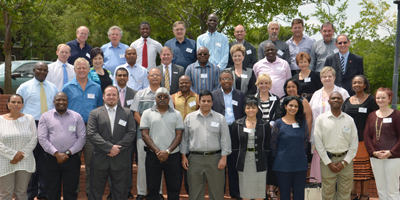Latest News Archive
Please select Category, Year, and then Month to display items
12 January 2024
|
Story Nonsindiswe Qwabe
|
Photo Sonia Small
 Since joining the UFS in 2008, Dr Grey Magaiza has worked extensively on approaches that can foster the socio-economic transformation of societies.
Since joining the UFS in 2008, Dr Grey Magaiza has worked extensively on approaches that can foster the socio-economic transformation of societies.
“The future should be one where communities can decide on their development agenda and futures. That’s the most important for me.” Dr Grey Magaiza, Deputy Director of the Centre for Gender and Africa Studies (CGAS) and Head of the Community Development programme on the Qwaqwa Campus, is passionate about capacitating communities to be agents of change and advancement. His vision for the future emphasises the empowerment of communities to take charge of their development by actively participating in decision making and the implementation of development projects that can improve their lives.
Since joining the UFS in 2008, Dr Magaiza has worked extensively on approaches that can foster the socio-economic transformation of societies. Over the years, he has crafted his research speciality into one that he is most proud of – being an interdisciplinary scientist immersed in the development of communities.
“I’m in a fortunate position of researching what I like. I say ‘fortunate’, because I’ve taken the time to understand what I’m passionate about, which is the overall field of rural livelihoods and livelihood futures – in short, community development. My research starts from an engaged university, understanding the elements that a university must use to enhance transformation and relevance to its immediate community in terms of development.”
One of the ways he has done this is by looking at social entrepreneurship as a development approach for young people in a rural setting. Through workshops with non-profit and civic organisations in Qwaqwa, Dr Magaiza has been helping these organisations to map out their needs and actively meet them through the involvement and support of external role players.
“We understand that communities are part of the national development agenda, but even that national agenda respects community knowledge and intentions and allows communities to shape their identity. A critical enabler of this is community organising. You bring back the capacity in communities to have dialogues on issues affecting them as spaces for engagement, knowledge exchange, and for people to just talk about their way forward.”
By enabling communities to define their development agenda, they can address their specific needs, challenges, and aspirations, he said. “When I look at livelihood futures, it’s quite an exciting aspect of my work – it’s like looking into a fortune tellers’ globe, because you’re not deciding for communities what they should do, but the communities themselves take those decisions.”
UFS hosts the 11th annual Registrars’ Imbizo
2014-03-14
|
 |
The University of the Free State recently hosted the 11thAnnual Registrars’ Imbizo which took place on 3 – 5 March 2014 at the Centenary Complex on the Bloemfontein Campus. Convening from across the country, up to 37 delegates affiliated to the Office of the Registrar shared their experiences and expertise. It also provided an opportunity to raise their concerns about their role in governance and academic administration.
At the opening of the Imbizo, Prof Driekie Hay, Vice-Rector: Academic Affairs, acknowledged the challenging and complex task of registrars in South African universities. Prof Hay highlighted the complexities in the history of higher education and the policy environment in particular. She raised concerns around funding for higher education, policy amendments passed through parliament and the newly-proposed reporting regulations for universities. She also referred to the introduction of a transformation oversight committee to evaluate the effectiveness of transformation at universities.
During the three-day Imbizo, delegates focused on matters such as finance and administrations, policy in higher education as well as social media and its impact on higher education. Dr Derek Swemmer, Registrar of the UFS and Chairperson, concluded the event. The visit included some sight-seeing – touring the Bloemfontein Campus and surrounds.